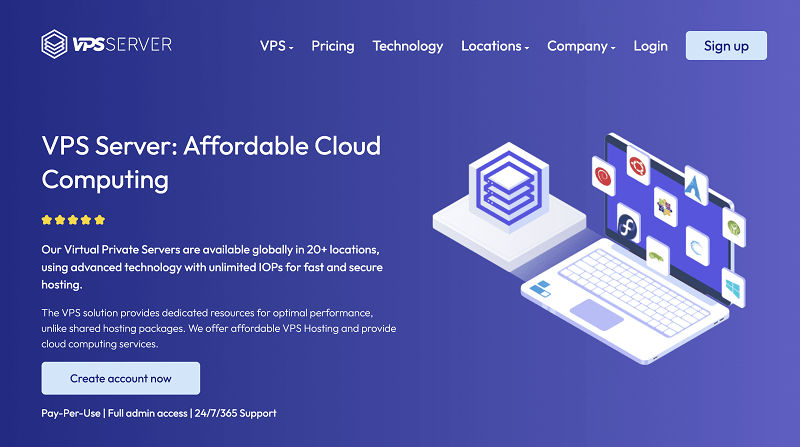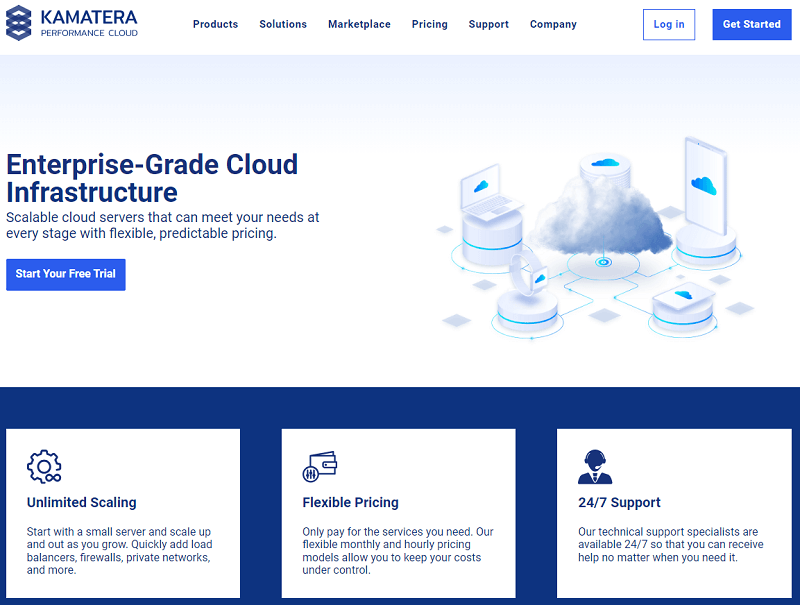Best VPS Hosts

Venturing into VPS hosting might seem like navigating a maze with so many services touting their excellence, reliability, and affordability. VPS hosting hits the sweet spot, offering a compromise between budget-friendly shared hosting and high-powered, expensive dedicated hosting, which is ideal for websites craving more resources. This article takes you through the cream of the crop in VPS hosting, scrutinizing what they bring to the table, how they price their services and their unique perks. We're on a mission to arm you with the insights needed to pick a VPS host, Linux VPS Hosting, or Windows VPS that fits like a glove with your website's requirements, propelling its performance and capacity for growth in the digital realm.
11 Best VPS Hosting Providers for 2024 and How to Choose the Right One

Setting out to find the best VPS hosting providers for 2024 is an adventure into a varied world of hosting solutions. You'll come across Linux VPS hosting, renowned for its stability and adaptability, and Windows VPS hosting services or Linux VPS Hosting, which are appreciated for their straightforward interface and smooth integration with Windows-centric applications. The decision between Linux and Windows operating systems is pivotal, as each brings its strengths to the table. Linux VPS hosting is celebrated for offering a dependable environment ideal for web servers, while Windows excels in its compatibility and integration with other Windows-based operating systems. This journey of discovery will highlight the distinct benefits and help determine the most suitable choice for your specific hosting needs.
VPS hosting plans are designed to meet various needs, offering configurations ranging from budget-friendly options with shared resources to high-performance setups with dedicated servers. For those prioritizing control and customization, Linux VPS hosting plans or Linux Distribution with full root access allow users to configure their servers to precise specifications. Meanwhile, Windows VPS hosting plans or Linux VPS Hosting might appeal more to those seeking familiar GUI-based management tools and VPS web hosting.
Selecting an apt VPS hosting provider is akin to tailoring a bespoke suit: the fit must be perfect. This process transcends mere OS preference, whether you're partial to esteemed Linux distributions such as Ubuntu and Red Hat Enterprise Linux VPS server, Linux Distribution, web server, or various Windows Server iterations. It requires meticulously evaluating the server's technical prowess, counting CPU cores, assessing RAM, and gauging SSD storage. But the scrutiny doesn't end there. The hosting service's track record of uptime guarantee, the strategic positioning of its data centers for optimal connectivity, and the excellence of its customer support are all fundamental elements that converge to create a seamless and robust hosting journey.
The perfect VPS hosting service strikes a harmony between performance, dependability, and customer support, ensuring a robust platform for hosting either dynamic web applications or static websites and can choose between Linux VPS or Windows VPS. Opting for a VPS plan is not just about meeting current needs; it's a thoughtful choice geared toward fostering long-term growth and adaptability. This decision should align with both immediate operational needs and future scalability goals, ensuring the hosting environment is primed to support your website's evolving trajectory.
1. VPSServer

Overview
-
Rating: 5/5
-
Suitable for: A range of users from beginners to advanced, seeking customizable VPS options with global access
-
Pricing: Starts at 4/month
VPSServer specializes in cloud VPS hosting, highlighting cost-effective and high-performance solutions with extensive global reach. The service stands out for its flexibility, offering a variety of plans across more than 20 locations worldwide, ensuring fast and secure hosting. With an emphasis on user empowerment, VPS Server provides comprehensive root access, allowing users to customize their digital space extensively, from operating systems to software packages.
The platform also caters to both managed and unmanaged VPS hosting preferences, giving users the choice of hands-on control or opting for the provider to manage the server environment. Technical features include advanced hardware, fast memory, powerful processors, and a user-friendly control panel for streamlined management and monitoring of VPS services, as well as a choice between Linux VPS or Windows VPS.
Main Features:
-
Global Data Centers: With over 20 locations, users can select a server close to their audience for improved performance and speed.
-
Customizable Plans: Flexible configurations for RAM and SSD storage to meet diverse needs and budgets.
-
Managed and Unmanaged Options: Offers both self-managed and provider-managed VPS hosting, accommodating different levels of user expertise and service requirements.
-
Advanced Security and Performance: Utilizes state-of-the-art security measures and network monitoring to ensure a reliable and secure hosting environment.
-
User-friendly Control Panel: This panel simplifies VPS management with intuitive tools for server adjustments, OS switches, and performance monitoring.
2. Kamatera

Overview
-
Rating: 4.9/5
-
Suitable for: A wide range of users, from individual developers to large enterprises, looking for scalable and flexible cloud VPS solutions
-
Pricing: Starts at 4/month
Kamatera distinguishes itself in the VPS hosting landscape with its cutting-edge cloud solutions, anchored by high-speed NVMe SSD technology. Since its foundation in 1995, Kamatera has been a trusted hosting provider that is versatile and can support various OS, such as Windows and Linux VPS Server. The company’s hallmark is its adaptable hosting model. It empowers clients to tailor their resource allocation in sync with their business's dynamic needs, offering the flexibility of monthly or hourly billing options to match their financial planning.
Kamatera's VPS hosting is renowned for its swift performance, which is underpinned by the advanced NVMe SSD technology. This technology significantly enhances access speeds and reliability over legacy storage technologies. On the security front, Kamatera is proactive and diligent, incorporating comprehensive security measures like firewalls, intrusion detection and prevention systems, and ongoing audits to safeguard the integrity and security of the hosted applications and services.
With its 24/7 technical assistance, Kamatera ensures continuous and readily accessible support. Through its suite of ready-to-use apps and services, it streamlines the deployment and management of various digital solutions. Additionally, Kamatera's global distribution of data centers enhances its ability to deliver top-notch performance and low latency, catering to a global clientele with efficiency and speed.
Main Features:
-
NVMe SSD Storage: Offers superior performance and reliability, ensuring fast access times and high data throughput.
-
Global Presence: With data centers in strategic locations worldwide, Kamatera serves a global clientele and ensures quick and reliable access.
-
24/7 Support: Round-the-clock technical support is available to assist with any server-related issues or queries.
-
Scalable Resources: Allows for the scaling of individual resources like CPU, RAM, and storage to match the specific demands of hosted applications.
-
Security and Compliance: Advanced security protocols and compliance measures are in place to protect data and maintain privacy.
3. Hostinger

Overview
-
Score: 5/5
-
Ideal for: Users seeking affordable, versatile VPS hosting
-
Cost: From 4.99/monthly
Hostinger presents four KVM VPS hosting packages that deliver top-notch functionality and features at a budget-friendly price. The benefits included are a complimentary snapshot, regular weekly backups, complete root access, a personal IP address, and unlimited website support.
Each package boasts NVMe SSD storage, which outpaces standard SSDs and ensures quick data access. The VPS options can handle a variety of tasks, including demanding applications, thanks to up to 8 CPU cores and 32 GB of RAM.
Moreover, Hostinger's VPS offerings are equipped with a user-friendly VPS Dashboard, which is filled with tools to streamline server management tasks. Features include a real-time monitoring tool, a one-click operating system installation, a web-based command terminal, and an AI-driven assistant.
Hostinger VPS clients can select from five data center locations at no extra charge and can add a CDN service to maximize website performance globally.
While Hostinger offers self-managed VPS hosting, its Customer Success Team is accessible 24/7 through live chat for any queries. They also provide a 30-day refund policy and a 99.9% uptime guarantee across all plans.
Hostinger's VPS hosting supports several Linux VPS hosting provider distributions, including Debian, CentOS, and Linux VPS. These distributions are known for their enhanced security compared to Windows Server. VPS OS templates with pre-installed Control Panel or software like Docker are also available.
Main Features:
-
VPS AI Assistant: This tool facilitates VPS management through easy prompts, generating instructions, commands, or code snippets, and simplifying hosting, particularly for users with limited technical knowledge.
-
Browser terminal: Allows server management remotely through a web browser, eliminating the need for SSH clients like PuTTY or Terminal.
-
Advanced security measures: These include BitNinja security, Suhosin PHP hardening, DDoS protection, an integrated firewall, and malware scanning in the VPS Dashboard.
4. LiquidWeb

Overview
-
Score: 4.8/5
-
Optimal for: Major corporations focusing on high stability and security
-
Cost: Beginning at 20/month
LiquidWeb is a dependable and secure VPS hosting provider that is perfect for large businesses. It features three different plan types, each tailored to specific requirements and user preferences.
The standard VPS plans are well-rounded, offering a mix of CPU cores, memory, and storage suitable for running several websites. Plans optimized for memory are ideal for database-heavy tasks, whereas those centered on CPU performance are best for high-traffic applications.
LiquidWeb guarantees 100% uptime guarantee and backs its services with a 30-day refund policy and round-the-clock customer support. Additionally, it includes complimentary Cloudflare CDN services for DDoS mitigation and Standard ServerSecure Advanced Security for web hosting, as well as full root access.
LiquidWeb's VPS hosting supports a variety of OS, Linux VPS, and Windows VPS, as well as control panels, and adjusts to different plan selections. The minimum biannual plan costs 20 per month, and an upfront payment of 480 is required.
Main Features:
-
Robust network infrastructure: LiquidWeb’s VPS users benefit from a 10 Gb/s redundant network that provides 10 TB of outbound bandwidth and unlimited inbound transfers.
-
Complimentary backup service: This service includes 50 GB of free Acronis Cyber backups with off-site storage, encryption, and anti-ransomware features for enhanced security.
-
Absolute uptime guarantee commitment: LiquidWeb assures 100% uptime for its VPS offerings and compensates for any downtime, which sets it apart from many other providers.
5. Ultahost

Overview
-
Rating: 4.7/5
-
Ideal for: Beginners in VPS who value features and cost-effectiveness
-
Cost: Begins at 5.50/month or 56 annually
Ultahost is known for its budget-friendly managed VPS hosting plans or a VPS Provider, which are perfect for newcomers. The service includes complimentary domain transfer and site migration, while additional services such as error resolution and software upgrades start from 25 monthly.
Ultahost's VPS packages come with extensive security measures like BitNinja protection, specific firewalls, and a no-cost SSL certificate. Additional benefits include various data center choices, an optional CDN, and enhanced caching for better server efficiency.
Although Ultahost offers unlimited bandwidth, its hardware capabilities are modest, with a maximum of 4 vCPU cores and 100 GB storage. The entry-level VPS hosting plan includes just 1 GB of RAM and allows hosting for up to seven websites.
Storage and domain capacity can be expanded through extra-cost add-ons. For instance, adding 100 GB of storage is priced at 10.49 monthly, and the ability to host unlimited domains costs 18 each month.
Main Features:
-
Enhanced security: Ultahost VPS plans include thorough security features such as complimentary SSL certificates, self-repairing infrastructure, routine security updates, automatic updates, and BitNinja security.
-
Collaborative team management: Facilitates shared server management among team members, enhancing the efficiency of handling virtual instances.
-
Automated script installations: Ultahost automates the setup process for various applications, offering scripts for easy installation of platforms like Joomla.
6. TransIP

Overview
-
Rating: 4.5/5
-
Intended Audience: Small enterprises seeking VPS solutions that are both adaptable and scalable.
-
Cost: From €2.99 per month
TransIP is recognized as a top choice for small businesses seeking a wide range of VPS hosting plans and scalability. It features over ten VPS plans categorized into BladeVPS, PerformanceVPS, and SandboxVPS, as well as a choice of Linux VPS or Windows VPS.
SandboxVPS is for testing environments, PerformanceVPS is for high-resource-demanding live applications, and BladeVPS is a versatile server solution that can be enhanced with additional resources.
TransIP provides features like snapshots, server monitoring, automated backups, firewalls, and private networking. However, the entry-level plans might only include some of these options, requiring an upgrade to more costly plans to access them.
A limitation of TransIP is its sole data center presence in the Netherlands and its non-24/7 customer support, which typically responds within an hour. Nevertheless, it compensates with an extensive knowledge base and thorough documentation.
Main Features:
-
Resource Add-ons: Users can enhance their server's capabilities with specific add-ons, such as extra CPU cores, RAM, storage, snapshots, and IPv4 addresses, offering a cost-effective way to scale.
-
TransIP API: This API features REST API support and facilitates automation, remote management, and performance tracking by allowing software interactions over the Internet.
-
HA-IP: HA-IP is an add-on feature that provides failover and load-balancing capabilities. It redirects traffic to a different instance, reducing the primary server's load and improving uptime.
7. Cloudzy

Overview
-
Rating: 4.8/5
-
Ideal for: Startups and individuals seeking scalable and economical options
-
Price: Begins at 4.95/month
Cloudzy specializes in cloud-based VPS solutions, offering the benefits of flexible resources, dependable service, and consistent uptime.
Their offerings include top-tier hardware such as NVMe SSD storage and DDR4 memory, complemented by a 10 Gb/s network across 15 global locations, with Linux VPS or Windows VPS.
Customers have the option to purchase additional bandwidth to extend their plan's resources. Cloudzy's technical support team is available 24/7 to assist with any inquiries or issues.
Pricewise, Cloudzy is an affordable choice, starting at 4.95/month. The preferred plan with 7 TB bandwidth and six vCPUs begins at 36.95/month.
Main Features:
-
Additional Services: The Cloudzy control panel allows users to purchase extra features, such as floating IP addresses, server snapshots, and more bandwidth.
-
Instant App Installation: With a single click, you can easily deploy popular applications and OS, including WordPress or MetaTrader 5.
-
Pay-As-You-Go Billing: Only pay for the resources you use, such as new servers, floating IPs, or extra bandwidth.
8. Rosehosting

Overview
-
Rating: 4.3/5
-
Optimal for: Businesses seeking comprehensive managed services
-
Price: Starting at 39.55/month
For those who prefer not to manage their server manually, RoseHosting offers fully managed VPS hosting, Linux VPS or Windows VPS, eliminating the need for direct configuration or server management.
RoseHosting takes care of various server management duties, such as hosting migration, server setup, software installation, and continuous monitoring. Its customer support is accessible 24/7 through live chat, email, and support tickets for swift problem resolution.
RoseHosting’s managed VPS hosting comes with robust hardware, unlimited bandwidth, and support for numerous websites, along with complimentary SSL certificates and weekly backups for enhanced security.
While RoseHosting provides quality-managed VPS services, it is priced higher than some competitors and operates only one data center in the United States. Therefore, using a CDN is advisable for optimizing global visitor performance.
Main Features:
-
Comprehensive managed services: RoseHosting’s VPS plans come with extensive management services, including site migration, server setup and customization, performance optimization, and issue resolution.
-
Continuous customer service: Users are entitled to lodge any number of support inquiries without extra fees.
9. Hostwinds

Overview
-
Rating: 4.3/5
-
Perfect for: Individuals or entities that require extensive control and the ability to adjust to changes.
-
Price: Starting at 4.99/month
Hostwinds offers versatile VPS hosting options that offer significant customization. Custom images and .iso files allow users to install a variety of OS, including Linux VPS Hosting Provider. The backup configurations are also flexible, allowing users to set the frequency, duration, and specific files for backup and restoration.
Hostwinds provides both managed and self-managed VPS hosting, catering to preferences for either autonomy or ease of use. Despite the difference in management level, both options share the exact hardware specifications and inherent functionalities.
Hostwinds’ VPS offers key offerings such as an advanced firewall, snapshot capabilities, and access to multiple data center locations. An automated monitoring system detects issues and initiates support tickets.
However, self-managed plans do not include support, which may not be ideal for novice users. Hostwinds’ data centers are located exclusively in the United States and the Netherlands.
Main Features:
-
Customizable OS installation: Hostwinds allows you to install various operating systems, including Windows VPS plans, using custom .iso files or disk images.
-
Load balancing capability: This capability enables traffic distribution across multiple servers to enhance performance and uptime by rerouting to operational servers.
-
Expandable storage: The Volume feature permits additional storage on servers and allows for the flexibility to transfer storage volumes between different servers.
10. Mochahost

Overview
-
Rating: 4.2/5
-
Perfect for: Small enterprises and e-commerce platforms.
-
Pricing: Starting at 8.38/month
Mochahost is recognized for its VPS hosting services tailored to e-commerce and small business websites. It offers a range of marketing tools, including a complimentary email marketing tool that facilitates straightforward newsletter campaigns, as well as Linux VPS or Windows VPS.
Additionally, Mochahost includes a free service for submitting your site to search engines, enhancing its visibility online. Clients also benefit from complimentary Attraca SEO and marketing tools designed to draw more visitors.
Mochahost’s VPS solutions provide a free domain name and unlimited SSL certificates, enabling a quick website launch. They ensure high security through malware defense, spam filtering, system health checks, and RAID 10 SSD storage.
Nevertheless, Mochahost still employs OpenVZ virtualization technology, which may not perform as well as newer systems like KVM. Its server specifications are relatively modest, with a maximum of 4 vCPU cores and 8 GB of RAM.
Main Features:
-
Lifetime Savings: Mochahost offers significant renewal discounts for two or three-year VPS contracts, reducing long-term expenses.
-
Unrestricted Bandwidth: All Mochahost VPS plans feature unlimited bandwidth, meaning there’s no data transfer or traffic limit.
-
Seamless CDN Setup: Mochahost automatically integrates your website with Cloudflare’s CDN, distributing content across global servers for faster access.
11. Contabo

Overview
-
Rating: 4.2/5
-
Ideal for: Businesses that require scalable server options
-
Pricing: Begins at 5.50/month
Contabo offers cloud VPS hosting with high-performance components at affordable rates, making it a good choice for businesses with demanding web applications.
Contabo also provides dedicated hosting plans that can be combined with VPS, facilitating scalable and robust infrastructure solutions. This flexibility makes it an attractive option for those seeking scalable hosting services.
Additionally, Contabo includes various tools to facilitate server management and development tasks, such as a WebUI control panel, compatibility with RESTful APIs, and cloud-init capabilities.
While Contabo has data centers across the US, Europe, Australia, and Asia, selecting a specific location incurs extra charges. Customer support is available 24/7 through a ticketing system, with phone support being more limited. Linux VPS and Windows VPS are also available.
A notable downside of Contabo is the extra hidden costs, such as data center selection fees and setup charges for subscriptions of six months or less.
Main Features:
-
Private Networking: Allows the integration of VPS and dedicated servers within a private network, facilitating scalable and complex infrastructure setups.
-
Cloud-init: A tool that automates system configuration tasks, including software installation and service initialization, streamlining new virtual instance deployment.
-
Contabo CLI: Offers a command-line interface (cntb) for managing Contabo VPS products, enabling tasks like instance creation or custom image uploads via Terminal or Command Prompt.
12. VPS2Day

Overview
-
Rating: 4/5
-
Suitable for: Beginners in VPS seeking user-friendly management tools
-
Pricing: Starts at €3 per month
VPS2Day provides a straightforward and unified management panel, making it simple for users to select, set up, manage, and enhance their VPS hosting services. Users can initiate a server by setting up an account, funding it, and choosing a plan within this platform, as well as Linux VPS or Windows VPS.
The control area includes a one-click installation feature for various programs, such as OpenVPN, Docker, k3s, LAMP, and HestiaCP. It offers options for additional features, such as backups and server monitoring.
Customers have the flexibility to choose and change their data center locations without extra cost through the management panel. Although VPS2Day has nine locations, they are primarily in Europe and the US.
However, VPS2Day has drawbacks, such as upfront deposits, extra charges for key features, and a shorter two-day refund policy than other providers. Customer support is limited to a ticket-based system.
Main Features:
-
Comprehensive management interface: VPS2Day’s platform offers a user-friendly control panel for streamlined management of VPS services, allowing easy purchasing, installation, and configuration.
-
Simplified one-click installation: This feature enables quick installation of applications, operating systems, or control panels, which is ideal for beginners who need to familiarize themselves with VPS command lines.
-
Full server access: This provides complete remote access, with full root access for Linux VPS hosting provider plans or Linux virtual server plans and RDP support for Windows plans.
How to Choose the Best VPS Hosting?

Picking suitable VPS hosting is essential, whether it's a Linux VPS or Windows VPS, as it profoundly affects both the immediate performance and the scalability potential of your online operations. Navigating through the vast selection of available options necessitates a careful evaluation of factors like the reliability of performance, scalability, cost-effectiveness, customer feedback, security protocols, and the geographical placement of data centers. This thorough analysis helps ensure that the VPS hosting service you select not only meets your business's current needs but also has the capacity and support structure to adapt and grow with your future requirements.
Performance and Reliability
In assessing the top VPS hosts and a VPS plan, especially when considering options like Linux VPS hosting provider or Windows VPS hosting, it's vital to examine the service's performance and dependability. Premier VPS hosting services invest in cutting-edge technology, including the most recent CPUs, high-speed RAM, and SSD storage, to facilitate swift data processing and minimize downtime, which is crucial for sustaining a high-performance web server.
A VPS hosting plan's reliability is often represented by its uptime guarantee, with 99.9% being the industry benchmark. This figure reflects the hosting provider's commitment to minimizing downtime and maintaining operational consistency, which is crucial for both Linux VPS hosting providers and Windows VPS plan environments. Whether you choose Linux VPS hosting providers or Windows VPS, maintaining steady performance, mainly when loads vary, is crucial for effectively managing web traffic.
Scalability, root access, dedicated IP addresses, and customer support are additional considerations. With full root access, users gain complete control over their virtual server environment, allowing for custom configurations and software installations. Reliable customer support, scalable resources, and robust security measures further define the quality of a Linux VPS hosting service or a Windows VPS Hosting Service, ensuring users can efficiently manage their hosting servers and web hosting needs.
Selecting a VPS hosting provider involves a comprehensive evaluation of their hosting plans, server performance, system reliability, and the range of supported operating systems, whether for Linux VPS hosting providers or Windows environments. Affordability, combined with these technical and service considerations, will guide users to the best VPS hosting solution for their specific web hosting requirements.
Scalability
Scalability is a crucial aspect of VPS hosting and a VPS plan, particularly for businesses and individuals experiencing variable website traffic, which requires an agile approach to resource management. Leading VPS hosting providers offer scalable solutions, enabling adjustments in CPU cores, RAM, and SSD storage to meet a web server's changing demands. This flexibility allows users to expand their hosting capabilities in tandem with their business growth, avoiding service interruptions and unnecessary expenses.
For a Linux VPS hosting plan, scalability means the ability to support a range of multiple Linux distributions and applications. It offers tailored solutions whether you need a basic Linux VPS hosting plan or a more complex setup with specific Linux operating systems like Rocky Linux or Linux VPS. Similarly, Windows VPS hosting should offer scalable Windows VPS hosting plans or Linux VPS to support various Windows Server environments, ensuring users have the necessary resources for their Windows-based applications.
Choosing a VPS hosting provider with a robust selection of scalable VPS hosting plans, whether it’s for a Linux VPS provider or Windows VPS hosting service, is essential. These plans should provide not only the flexibility to scale resources but also features like a dedicated IP address, full root access, and advanced control panels, enhancing the management of the virtual server environment. The hosting provider needs to operate data centers across various locations, enhancing the scalability and reliability of the VPS hosting service. This geographical diversity helps in providing a robust uptime guarantee, ensuring consistent and dependable access to the VPS servers.
Whether you opt for a Linux VPS or Windows VPS hosting, the key is to have a VPS plan that offers scalability to meet changing needs. Such flexibility is vital for ensuring your hosting arrangement can efficiently adapt to your growing requirements, allowing your infrastructure to scale in line with your business growth or personal project expansion.
Value for Money
Evaluating the value for money in VPS hosting goes beyond just looking at the costs; it entails a thorough understanding of the entire range of services provided by each hosting plan. An affordable prices VPS hosting plan should be not only affordable but also rich in features, offering essential elements like full root access for total server control and an intuitive control panel to simplify the management process for users of both Linux VPS and Windows systems.
When considering Linux VPS hosting or Windows VPS hosting services, evaluate if the plan includes essentials like a dedicated IP address, which can provide better stability and SEO advantages for hosting websites. Also, consider the availability of SSD storage for faster data access and improved server performance, as well as the provision of dedicated CPU cores to handle your applications' demands efficiently.
It's also important to consider the hosting service's infrastructure. Opt for a VPS hosting provider with data centers in multiple locations to reduce latency for your end-users and ensure they offer an uptime guarantee to keep your virtual servers running smoothly. Additionally, whether you need a Linux VPS server with a specific Linux distribution (Linux distros) like Linux VPS or Rocky Linux or a Windows VPS for a Windows server environment, the best Virtual Private Server should offer a range of operating systems to suit your requirements.
The best value for money in Linux VPS hosting or Windows VPS Hosting comes from finding a balance between affordable prices and the inclusion of essential services and features that meet your hosting needs. This balance ensures that you're investing in a VPS hosting service that not only fits your budget but also supports the performance and scalability of your online presence.
User Reviews and Reputation
User reviews and a Virtual Private Server hosting provider's reputation are critical indicators of the quality and reliability of their services, whether a Linux VPS or Windows VPS. Positive feedback often reflects a high level of customer satisfaction. It indicates that the hosting service reliably meets user needs, from the performance of VPS servers to the responsiveness of customer support. Evaluating a provider's reputation involves looking at their history in the industry, their ability to offer consistent service, and their expertise in managing a range of hosting environments, including dedicated hosting and Cloud Server.
When examining user reviews, consider factors like the provider’s ability to support popular Linux VPS server distributions and Windows servers, the performance of their web servers and SQL server support, and the inclusion of features like SSD storage and remote desktop access. A provider's reputation is also influenced by the availability of data centers in multiple locations, support for Multiple Linux distributions like Rocky Linux, Linux VPS plans, and the provision of dedicated IP addresses.
Customer feedback and a hosting provider's reputation give insights into the actual performance and dependability of their VPS hosting services, whether they are Linux VPS or Windows VPS. Such information can aid prospective clients in making well-informed choices when looking for a hosting service that perfectly melds functionality, performance, and affordability.
Security Measures
Implementing robust security measures is critical to protecting data and applications from cyber risks in the VPS hosting world. Dependable hosting providers incorporate extensive security strategies, including firewalls, intrusion detection and prevention systems (IDPS), and SSL certificates, to strengthen the defense of the virtual server space against possible security breaches. Such security components are indispensable in any VPS hosting package, whether for Linux distributions (Linux distros) or Windows VPS hosting, to maintain data integrity and privacy.
Regular security assessments and conformity with industry guidelines and laws reflect a hosting provider's allegiance to data security and confidentiality. For Linux VPS or Windows VPS hosting solutions, adherence to protocols like ISO/IEC 27001 or GDPR underscores the provider's commitment to safeguarding security, offering users peace of mind regarding the hosting service's security measures.
Providers of the best VPS hosting services typically offer root access, allowing users to implement their security measures and customize their server's security posture. However, this level of access necessitates a higher degree of responsibility for maintaining the server's security. Therefore, VPS hosting providers should also offer guidance and support to users, particularly those utilizing popular Linux VPS or Windows operating systems, to manage their servers securely.
Potential users should thoroughly evaluate the security measures and compliance standards the provider upholds when selecting a VPS hosting provider. They should ensure they choose a VPS hosting plan that offers optimal performance scalability and robust security to protect their online assets.
Data Center Locations
The placement of data centers significantly influences VPS hosting, affecting performance attributes like latency and speed, as well as compliance with data storage regulations. Choosing a VPS host with data centers proximal to your primary market can enhance website performance and app responsiveness. For example, a Linux VPS hosting service (Linux Operating System) with dispersed data centers can decrease latency for numerous Linux distributions or Linux VPS plans, including well-known ones such as Red Hat Enterprise Linux and Rocky Linux VPS Provider, thus optimizing service delivery.
Selecting the location of your VPS hosting provider's data centers is crucial due to legal considerations, such as adherence to GDPR in Europe or CCPA in California. It's vital to ensure that the data centers of your chosen hosting provider comply with the legal standards applicable in the regions where your data will reside and be processed.
The data center's infrastructure, offering elements like dedicated IP addresses, strong server environment management, and effective customer service, is crucial in upholding the service's dependability and continuity. The data center's features will deeply influence the type of hosting service chosen—be it shared, dedicated, or cloud servers—and, in turn, affect the web host service's performance and stability.
The locations of your Linux VPS hosting or Windows VPS Hosting provider's data centers are crucial for your site's and apps' performance, adherence to legal standards, and security. A thorough review of these aspects will help you choose a data center that effectively meets your technical, legal, and operational needs.
Learn More About Virtual Private Servers (VPS) Providers
Providers of Virtual Private Servers (VPS) deliver services that enable both individuals and businesses to manage their own separate server spaces on shared physical infrastructure. VPS hosting merges the cost-effectiveness of shared hosting with the autonomy and adaptability of dedicated hosting. Essential elements of VPS hosting include complete server control, the capability to install custom software, and the allocation of resources that are not affected by other users on the same machine. These providers offer a range of packages, giving customers the freedom to select the amount of processing power, memory, and storage space that meets their requirements. Clients have access to scalable resources and usually receive specialized support from the provider to maintain the best possible server functionality and reliability.
What are Virtual Private Servers (VPS)?
Virtual Private Servers present a web hosting choice that merges the economic advantages of shared hosting with the superior performance of dedicated hosting with Linux VPS Hosting or Linux VPS Hosting Providers. Each VPS functions independently within a shared physical server, granting dedicated resources like CPU, storage, RAM, and full root access. This setup allows for greater control, scalability, and customization and supports a variety of operating systems and applications. Thus, it is suitable for those needing more than shared hosting but less than a dedicated server.
What Does VPS Stand For?
VPS (Virtual Private Server) refers to the division of a physical server into multiple isolated virtual servers using virtualization technology, each with its own resources like CPU, RAM, and storage. This setup offers users control similar to a dedicated server, including complete root access while allowing for customizable hosting plans across various operating systems. The "private" component denotes the secure, self-contained operation of each virtual server, which is ideal for website hosting, application execution, and data management, offering increased privacy and control.
What are the Common Features of Virtual Private Servers (VPS)?
Virtual Private Server hosting typically encompasses scalable resources such as CPU, RAM, and storage tailored to specific requirements, complete root access for server personalization, and an enhanced security level relative to shared hosting. Users manage their VPS through a control panel and can choose between Linux VPS or Windows operating systems. Data centers provide the infrastructure and support necessary for reliable and versatile hosting solutions.
What are the Alternatives to Virtual Private Servers?
Alternatives to Virtual Private Server hosting (Linux VPS or Windows VPS) include dedicated hosting, which offers exclusive server use for high control and performance, and cloud hosting, providing scalable, flexible solutions across multiple servers. These options suit different needs, with dedicated hosting ideal for high-demand sites and cloud hosting for variable traffic. Factors like root access, server type, and OS preference should guide the choice between Linux VPS or Windows VPS, dedicated or cloud hosting. Plan, ensuring the hosting environment aligns with the user's technical needs and business goals.
Challenges with Virtual Private Servers (VPS)
VPS hosting (Linux VPS or Windows VPS) involves technical complexities, including software upgrades and server upkeep, which can pose difficulties for individuals with minimal technical knowledge. Although Linux VPS or Windows provides greater resources and improved performance compared to shared hosting, it might not reach the capabilities of dedicated servers for applications with high requirements. Choosing the right VPS solution requires considering technical needs, support quality, and the hosting provider's services, as well as balancing between Linux VPS Hosting and Windows VPS based on application requirements and available resources.
Frequently Asked Questions
What exactly is a VPS?
A VPS gives you the benefits of your dedicated area in a larger complex, providing autonomy and control, all without the financial burden of owning the entire property.
How does VPS hosting stand out from shared or dedicated hosting?
VPS hosting delivers a specific share of a server's capacity, offering enhanced control and superior performance over shared hosting, where resources are divided among various users. It's more cost-effective than dedicated hosting, which dedicates the entire server to one user, making VPS an ideal choice for sites that surpass shared hosting's limits but don't yet need the exhaustive resources of a dedicated server.
Why go for VPS hosting?
VPS hosting stands as the ideal choice for sites that have expanded beyond the capabilities of shared hosting but don’t yet see the need or have the budget for the exclusivity of a dedicated server, striking a perfect balance with its cost-effective approach, robust performance, and substantial administrative autonomy. Whether it's a Linux VPS or Windows VPS
Who should really look into VPS hosting?
VPS hosting is the next logical move for those experiencing growth in website traffic and needing increased capacity and customization. It is ideal for enterprises and individuals with technical knowledge.
What should I look out for when picking a VPS host?
Consider your website's requirements, prioritizing consistent performance, growth capacity, reliable support, competitive pricing, and uptime assurances to ensure a continuous online presence. Also, the type of the operating system, Windows Server or a Linux VPS
Can I tailor my VPS to my needs?
Absolutely! Most VPS hosts let you mix and match resources like CPU, memory, and storage to fit your site’s needs or use a Linux VPS Hosting or Windows Hosting. Plus, you often get to choose your operating system and set up your server environment just the way you like it.










